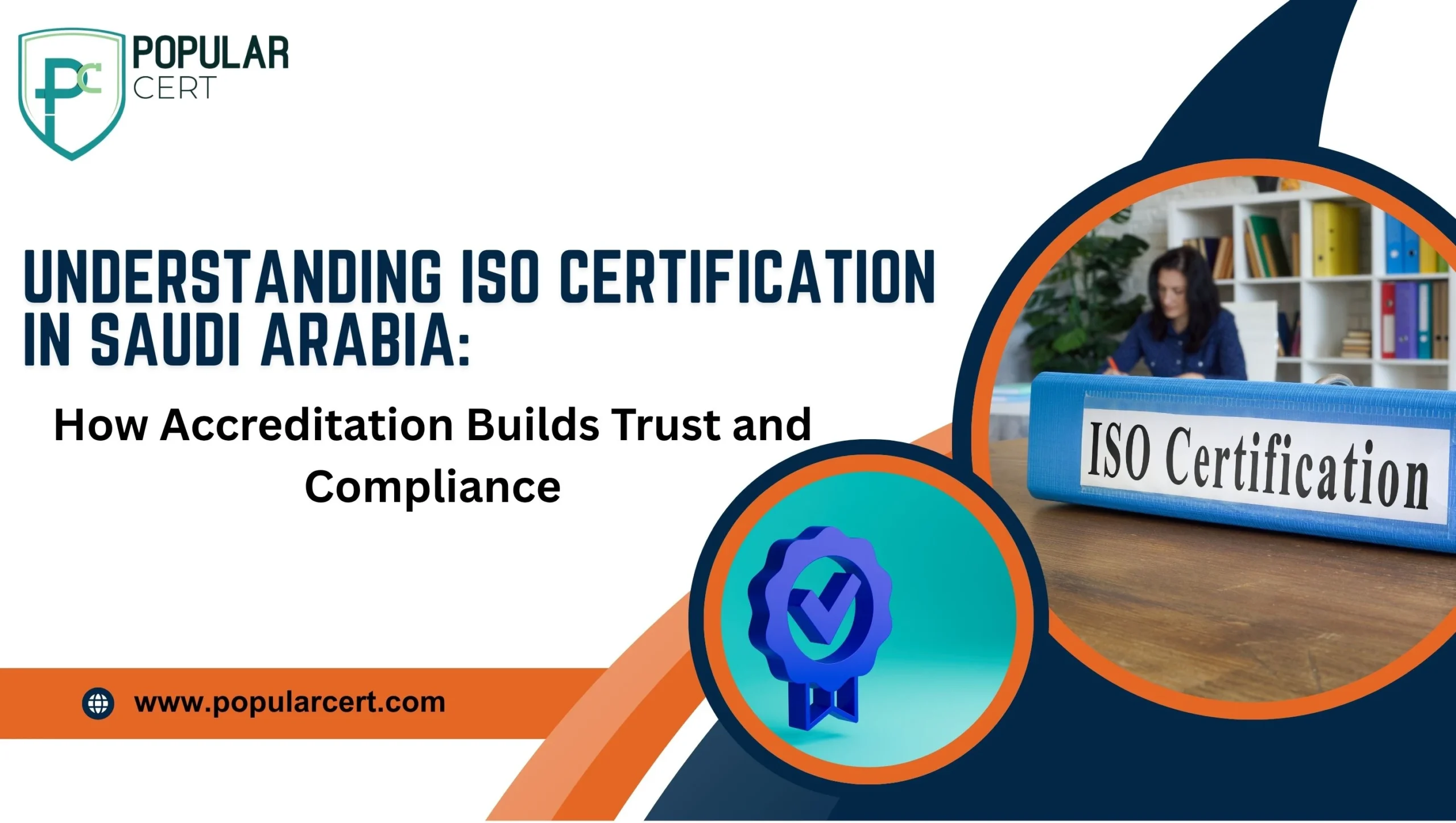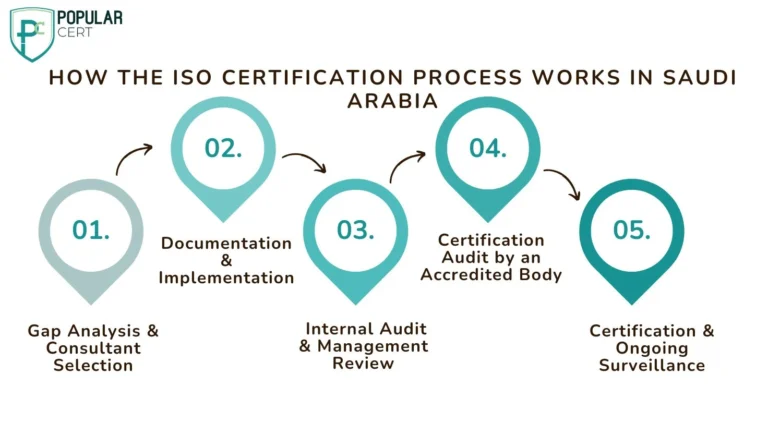Understanding ISO Certification in Saudi Arabia: How Accreditation Builds Trust and Compliance

Introduction
In Saudi Arabia, acquiring an ISO certificate has become essential for gaining a trust mark, ensuring adherence to regulations, and maintaining a competitive edge in the market. Regardless of whether your business lies in the oil and gas sector, construction, healthcare, logistics, or IT, obtaining an
ISO Certification Saudi Arabia elevates your business reputation and opens doors for domestic expansion and global recognition. However, what comes even more vital than an ISO certificate is an ISO accreditation which assures the competency of the certifying body and its global standing. This guide will focus on the Saudi market to explain what ISO certification entails, what roles accreditations play, and how your business can gain compliance without any uncertainties.What is ISO Certification and its Importance in Saudi Arabia
An ISO certification is awarded by an independent entity after reviewing the internal processes of a company and finding them in alignment with one of the ISO standards. The standards published by an ISO cover areas such as reputation management, cybersecurity, ecosystem and environmental practices, and other numerous domains.
Standards that can be met through ISO certifications are helpful for:
- ISO 9001 – Quality Management
- ISO 14001 – Environmental Management
- ISO 27001 – Information Security
- ISO 45001 – Occupational Health & Safety
- ISO 22000 / HACCP – Food Safety
In Saudi Arabia, the demand for ISO certification has surged due to:
- Meeting the goals outlined in Vision 2030 reforms
- Facilitating Government Tenders with Export and International Trade
- Compliance with mandated issuances from the government
- Digitization, cybersecurity, sustainability and/or modern advancements boost
ISO Certification vs ISO Accreditation: What is the Differentiation?
ISO Certification
- Given post-system auditing, issued to companies.
- Conformance to appropriate ISO benchmarks is acknowledged (e.g., ISO 9001, ISO 27001).
- Validates achievement of operational excellence, process management, and quality standards.
ISO Accreditation
- Designated received verification from regulatory bodies; not companies.
- Guarantees these certifiers are neutral and skilled.
- UKAS (UK), ANAB (US), IAS (International), and SASO (Saudi Arabia) are accreditors.
- In absence of accreditation, an ISO certificate risks losing its value in formal and international contexts.
To summarize: Certification validates an entity’s ability to claim a defined benchmark. Validation in comparison is done on the certifier’s credentialed entity.
Types Of Certification
- ISO Certification
- ISO 9001 Certification
- ISO 14001 Certification
- ISO 45001 Certification
- ISO 22000 Certification
- ISO 27001 Certification
- ISO 17025 Certification
- ISO 13485 Certification
- ISO 20000-1 Certification
- ISO 22301 Certification
- ISO 50001 Certification
- ISO 37001 Certification
- IATF 16949 Certification
- ISO 29001 Certification
- ISO 31000 Certification
- ISO 20121 Certification
- ISO 10002 Certification
- ISO 41001 Certification
Get Free Consultation
Our Clients


















Significance of ISO-Accredited Certification Bodies in Saudi Arabia
- Regulatory Compliance & Eligibility For Tenders – Many Saudi ministries and global firms stipulate ISO certificates solely from accredited certification bodies. Accreditation engages compliance with local regulators like SASO, and certificate buyers from other countries might reject undocumented unaccredited certificates.
- Enhances Global Confidence – ISO accredited documentation is accepted across countries. Exporting petrochemicals? Providing digital services? These accredited irrefutably gain traction from international buyers.
- Avoids Risk of Invalid Certifications – Your investment could incur losses without an accredited entity for your ISO certification, as it can get nullified. This jeopardizes audit integrity. Partnering with accredited entities assures coverage and safeguards your investment.
How the ISO Certification Process Works in Saudi Arabia

Step 1: Gap Analysis & Consultant Selection
It makes sense to approach a certification body only after hiring an ISO consultant familiar with Saudi Arabia’s regulations, sector requirements, and documentation to strategically plan all the steps towards accreditation certification.
Step 2: Documentation & Implementation
In alignment with the selected ISO standard, the consultant assists with developing case specific systems, policies, procedures, and SOPs pertinent to the systems.
Step 03: Internal Audit & Management Review
An internal pre-audit review confirming readiness is done. The management reviews the system, addresses the gaps, and puts measures to close them.
Step 04: Certification Audit By An Accredited Body
A certification body accredited for ISO conducts a two-stage audit.
- Stage 1: Document review
- Stage 2: Verification and interview of the employees on site
Step 05: Certificate and Ongoing Surveillance
After the audit, the company is awarded ISO certification which is valid for 3 years. Annual surveillance audits are conducted to ensure compliance continues.
Most Used ISO Standards In Saudi Arabia
-
ISO 9001: Quality Management
Applicable in numerous sectors such as manufacturing & services, healthcare, and government. -
ISO 27001: Information Security Management
Fintech, and telecom along with public sector digital projects have significant demand. -
ISO 14001: Environmental Management
Contributes to the ESG and sustainability goals of Saudi Arabia. -
ISO 45001: Occupational Health & Safety
Essential for construction, logistics, and oil and gas, along with other industries. -
ISO 22000 / HACCP: Food Safety Management
Applicable for restaurants, catering services, food manufacturing, and aggregating companies.
What Popularcert Does to Simplify ISO Certification In Saudi Arabia
At Popularcert, we simplify the steps to obtain ISO certification by partnering with SASO, IAS, UKAS, and IAF accredited certification bodies.
We help with:
- Advising on the relevant ISO standard aligned to the company’s industry.
- Consultancy, documentation, and training.
- Work on all components of the certification project.
- Continuous assistance with monitoring and re-certification audits.
We serve local SMEs to multinational company branches by tailoring Saudi Arabia’s requirements and aligning them with international standards.
Guidelines to Selecting an ISO Consultant in Saudi Arabia
- Ensure they work with accredited certification bodies
- Allocate budget on consultants from your industry specialization (oil, IT, food, etc.)
- Inquire about full support for the documentation and audit processes.
- Check references, project timelines, and especially pricing if it’s itemized and clear.
Aside from the obvious savings in time, a reliable consultant eliminates costly errors, ensuring the best possible certification outcome.
Conclusion: Select ISO Certification That Is Both Trusted And Recognized
Accreditation determines the credibility of certification, however, ISO’s strategically aid in growth and compliance.
Accredited certification instantly verifies your business operations beyond borders, especially for those in a fast-paced economy like Saudi Arabia.
Get Certified with Confidence – Powered by Popularcert
Need an ISO Certification from a reliable and acknowledged certification body in Saudi Arabia?
Contact us at Popularcert. We will work with you right from your initial contact.
Schedule your no-cost consultation today for a guided certification journey with our comprehensive assistance from gap analysis to certification.
GET A FREE CONSULTATION NOW
FAQs
What is ISO Certification, and why is it important in Saudi Arabia?
ISO Certification is an internationally recognized validation that a company’s processes meet specific standards. In Saudi Arabia, it’s important for regulatory compliance, tender eligibility, and enhancing customer trust — especially in sectors like oil & gas, healthcare, and IT.
Who provides ISO Certification in Saudi Arabia?
ISO certification is provided by certification bodies that are accredited by recognized organizations like SASO, IAS, UKAS, or ANAB. Popularcert connects you with such accredited bodies for credible certification.
How long does it take to get ISO Certified in Saudi Arabia?
The timeline varies depending on the standard and the size of your organization, but typically it takes 4 to 12 weeks from gap analysis to final certification.
Is ISO certification mandatory for businesses in Saudi Arabia?
While not always legally required, many government contracts and industry regulators in Saudi Arabia require ISO certification for vendor eligibility and compliance with international standards.
What is the cost of ISO Certification in Saudi Arabia?
ISO certification costs vary based on the standard (e.g., ISO 9001, ISO 27001), company size, and complexity. Popularcert offers customized, competitive pricing with no hidden fees — and only works with accredited bodies to ensure value for money.
